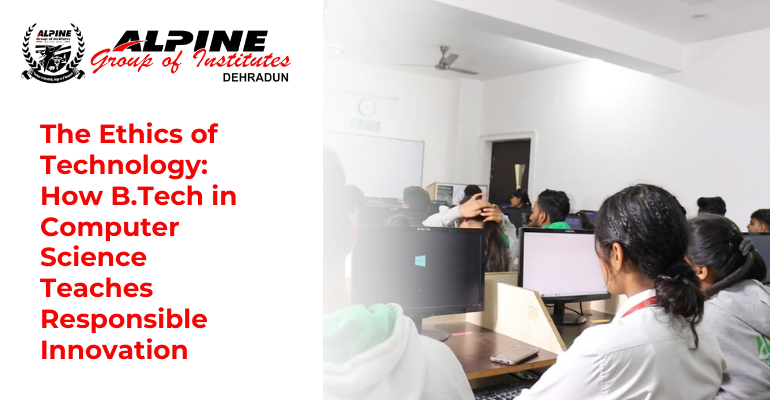The Ethics of Technology: How B. Tech in Computer Science Teaches Responsible Innovation
2024-12-19 7:00The Ethics of Technology: How B. Tech in Computer Science Teaches Responsible Innovation
In today’s rapidly evolving technological landscape, the development of cutting-edge technologies brings with it not only opportunities but also ethical challenges. From the rise of artificial intelligence (AI) and machine learning to data privacy issues, the decisions made by computer scientists shape the future of society. As such, B. Tech in Computer Science programs play a crucial role in teaching students the importance of responsible innovation—ensuring that the technologies they create are used for the betterment of society while avoiding harm.
Why Ethics in Technology Matters
Technology has the potential to radically transform how we live, work, and interact. However, with great power comes great responsibility. Ethical considerations in technology development have become more important as technology infiltrates every facet of our lives, from health care and education to transportation and entertainment.
For example:
- AI and Bias: Machine learning models, when not trained properly, can perpetuate societal biases, leading to unfair outcomes. A biased algorithm used in hiring could discriminate against certain groups, while biased facial recognition technology could result in wrongful accusations.
- Data Privacy: As more personal data is being collected by tech companies, issues surrounding privacy and data security are more important than ever. How do we balance the benefits of personalized services with the need to protect users’ privacy?
- Autonomous Systems: Self-driving cars and drones are set to revolutionize transportation and logistics. However, the ethical decisions made by these systems (e.g., how they should prioritize human life in unavoidable accidents) raise significant moral dilemmas.
Given these challenges, B.Tech in Computer Science programs now emphasize the importance of ethics in the development, deployment, and governance of technology.
Ethical Topics Covered in B. Tech in Computer Science Programs
- Data Privacy and Protection Students are taught how to handle personal and sensitive data responsibly. With regulations such as GDPR (General Data Protection Regulation) and HIPAA (Health Insurance Portability and Accountability Act) becoming more prevalent, computer science programs emphasize the legal and ethical frameworks surrounding data privacy.
- Topics Covered: Encryption, data anonymization, secure data storage, and data access controls.
- Learning Outcome: Understanding the importance of safeguarding personal information and ensuring that data is only used with informed consent.
- Algorithmic Fairness and Bias Algorithms are at the core of many technologies, from social media feeds to loan approval systems. However, algorithms can inadvertently reflect or amplify societal biases, leading to unfair treatment of certain groups. In B. Tech in Computer Science, students are educated about the ethical implications of biased algorithms and how to build systems that promote fairness.
- Topics Covered: Bias detection, fairness metrics, and methods for designing equitable algorithms.
- Learning Outcome: Developing algorithms that are fair and transparent and understanding how to mitigate the risk of bias.
- Artificial Intelligence and Responsible AI As AI continues to evolve, so do the ethical concerns surrounding its use. Questions about autonomy, accountability, and transparency arise, especially in decision-making processes like healthcare diagnostics or criminal justice. Students in B.Tech in Computer Science are introduced to the ethical frameworks for developing responsible AI systems.
- Topics Covered: Explainable AI, accountability, AI ethics guidelines, and the societal impact of AI.
- Learning Outcome: Graduates are equipped to design AI systems that are transparent, ethical, and beneficial to society.
- Cybersecurity and Ethical Hacking As digital platforms become the target of cyberattacks, the responsibility to protect user data and infrastructure has become a critical part of ethical technology development. In B.Tech in Computer Science, students learn about ethical hacking and the principles of cybersecurity to prevent data breaches, hacking, and cybercrime.
- Topics Covered: Penetration testing, vulnerability assessments, ethical hacking, and cyber laws.
- Learning Outcome: Developing systems with built-in security features to ensure user safety and building a strong ethical understanding of digital privacy and protection.
- Digital Inclusivity and Accessibility Technology should be accessible to everyone, regardless of their abilities or background. B.Tech in Computer Science programs stress the importance of creating inclusive technologies that can be used by people with disabilities or those from marginalized communities.
- Topics Covered: Universal design principles, accessibility features in software development, and inclusive technology policies.
- Learning Outcome: Designing systems and applications that are usable by a diverse group of people, ensuring that technology is inclusive and equitable.
How B. Tech Programs Teach Ethical Innovation
- Ethics Courses and Seminars Many B.Tech in Computer Science programs have dedicated courses on technology ethics, where students are introduced to philosophical, societal, and moral considerations surrounding technological advancements. These courses often include case studies, debates, and real-world examples to illustrate ethical dilemmas and how they were addressed (or not addressed).
- For example, students might study the ethical issues surrounding Facebook’s data handling practices or explore the ethical debates around surveillance technologies.
- Project-Based Learning Students are encouraged to work on real-world projects where ethical considerations are a key focus. For example, a project involving AI or machine learning might require students to analyze and mitigate potential biases in the training data. These practical experiences help students understand how ethics are integrated into the development process.
- Projects could involve designing ethical software applications, developing privacy-focused technologies, or conducting audits of existing systems for ethical concerns.
- Collaboration with Industry Leaders Many universities collaborate with tech companies, research institutes, and ethics boards to expose students to current ethical challenges in the field. Industry leaders often hold seminars or mentorship programs, offering students insights into the ethical frameworks that companies use when developing new technologies.
- Ethical Hackathons and Competitions Hackathons and coding competitions that focus on ethical technology development are increasingly popular in B. Tech Computer Science programs. These events often challenge students to develop innovative solutions while adhering to ethical guidelines, like building security solutions or creating accessible apps.
- Interdisciplinary Learning Ethical issues in technology often span multiple disciplines, including law, philosophy, and sociology. B.Tech in Computer Science students are encouraged to take interdisciplinary courses or engage in discussions that broaden their understanding of technology’s societal impact.
- For example, a student may take a course in ethics, sociology, or law to explore the intersection of these fields with technology development.
The Future of Ethical Innovation in Computer Science
As technology continues to evolve, the responsibility of ensuring ethical standards remains paramount. Graduates of B.Tech in Computer Science programs will play a critical role in shaping the ethical landscape of the future, whether through responsible AI development, creating secure systems, or ensuring digital equity.
The increasing focus on ethics within computer science education reflects the industry’s growing recognition that innovation should not come at the cost of fairness, safety, or privacy. In the years ahead, ethical technology development will be a defining characteristic of successful, sustainable, and socially responsible tech companies.
In conclusion, B. Tech in Computer Science does more than just equip students with technical skills—it fosters a deep understanding of the moral and societal implications of their work. By teaching responsible innovation, universities ensure that future tech leaders not only build the technologies of tomorrow but do so in ways that benefit society while minimizing harm. This blog emphasizes the growing importance of ethical considerations in technology and how B. Tech in Computer Science programs are ensuring that students understand and integrate these principles into their future careers.









